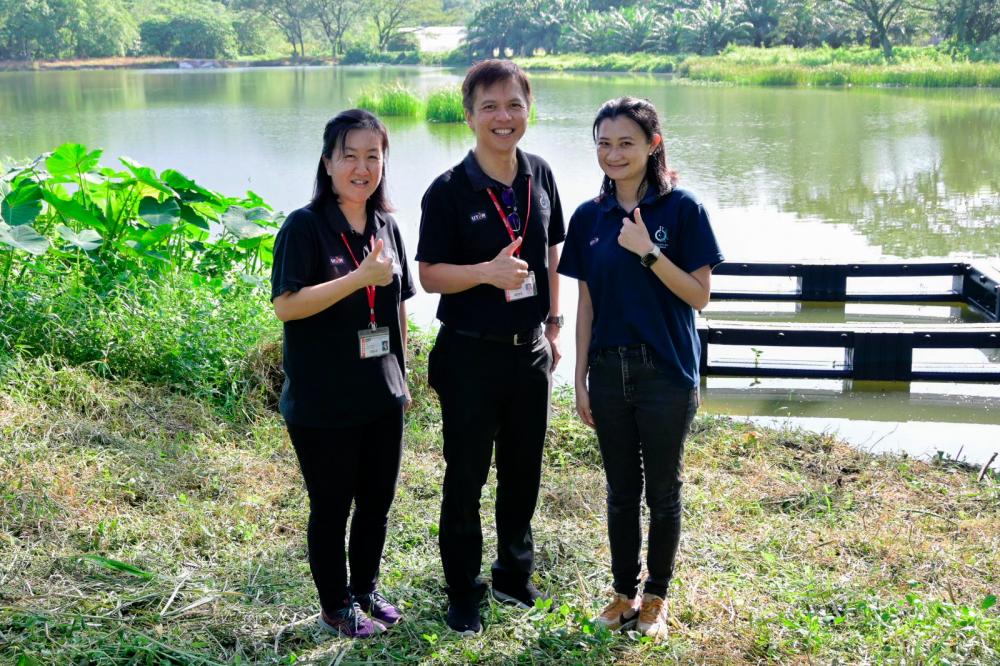UTAR’s commitment to sustainability remains one of the core principles to equip not only young talents but also the local communities with skills and knowledge to build a future of sustainable food production and environmental conservation.
As issues such as difficulties in land acquisition, rising production cost, water pollution, and the threat of diseases in the aquaculture sector threaten food security and human health, stakeholders, including universities, must join hands to explore innovative solutions.
In Kampar, Perak, the local geographical landscape offers an abundance of unattended water bodies, the result of the area’s tin mining past.
These water bodies can, in turn, be transformed into valuable resources for sustainable development, including aquaculture.
The idea of preventing old mines from going to waste sparked the revitalisation of Lake 5 at UTAR Kampar Campus, an ongoing fish farming project kick started by the researchers at UTAR Faculty of Science (FSc) Assoc Prof Dr Wong Wey Lim, Ts Dr Teoh Chaiw Yee, and Dr Ooi Ai Lin.
Highlighting the risk posed to the environment, the leader of the aquaculture project Dr Wong said, “The abandoned ponds and lakes around Kampar are valuable resources for agriculture, especially for sustainable aquaculture that focuses on providing high-quality proteins.
“The natural ecosystem formed at the ponds would die over the years if they continued to be left unattended. Once the ponds dry up, it will not only affect local biodiversity and ecosystem, but also make agriculture activities in these ponds impossible, leaving us with lands that are no longer viable for cultivation.”
In their efforts towards revitalising lakes and ponds around Kampar, the team has previously transformed Lake K11, located at UTAR Agriculture Park, into an educational site.
It serves as the model lake for research advancement as well as a way to educate local communities on transforming abandoned ponds into a start-up commercialisation platform.
The transformation of Lake 5 represents the first UTAR ecological aquaculture project that involves deep collaboration with an industry partner. It essentially serves as a fish farm that not only promotes sustainable fish production and commercialisation, but also strengthens university-industry research collaboration.
He added, “Our goal is to sustainably produce high-quality proteins to nourish society, while promoting fish production practices that minimise environmental impact.”
In this project, the team collaborated with PNT Gading Enterprise experts to cultivate high-quality fish based on sustainable methods.
While the research team from UTAR monitors the conditions of the lake and provides scientific guidance, the enterprise provides its expertise in on-site operations and marketing.
Lake 5 cultivates a variety of freshwater fish species, including milkfish, patin, and carps. To ensure high-quality fish while preserving the lake’s ecosystem, Dr Wong’s team harnesses the lake’s natural resources, including its body of water, space, and ecological assets, focusing on biological integration and thus achieving the concept of self-sustainability.
There is potential for the development of aquaculture at Kampar’s lakes
Beyond its role as a fish farm, Lake 5 also serves as a research hub that drives research innovation among agriculture students, offering hands-on experience in sustainable aquaculture, water quality management, and ecosystem balance.
“As more lakes will be revitalised in the near future, we hope to collaborate with more industry players, as it will help to improve the farming and marketing techniques of local aquaculturists, and at the same time, we can make better use of the natural resources of the lake to sustainably produce freshwater fish for the local market,” said Dr Wong.
The transformation of Lake 5 at UTAR Kampar Campus further underscores the university’s commitment to integrating academic and industry expertise to achieve greater heights. It also marks a significant step towards ensuring food security and preserving natural resources for future generations.
As the FSc team continues to explore joint initiatives with more industry partners, the Kampar community can look forward to the prospect of enjoying aquatic proteins that are sourced from sustainable and healthy aquaculture farms.
UTAR offers over 140 programmes from foundation studies to bachelor, master’s and PhD degrees in accounting, business, finance and economics, actuarial science, mathematics and process management, agriculture and food science, arts, social sciences and education, chinese studies, creative industries, digital animation, multimedia and design, engineering and built environment, information and communication technology, life and physical sciences, and medicine and health sciences.
Visit UTAR Open Day on May 24-25 May and May 31 - June 1, 2025 from 9am to 4.30pm at both Kampar and Sungai Long campuses. For more information, go to www.utar.edu.my or call 05-468 8888 (Kampar Campus), 03- 9086 0288 (Sungai Long Campus).









